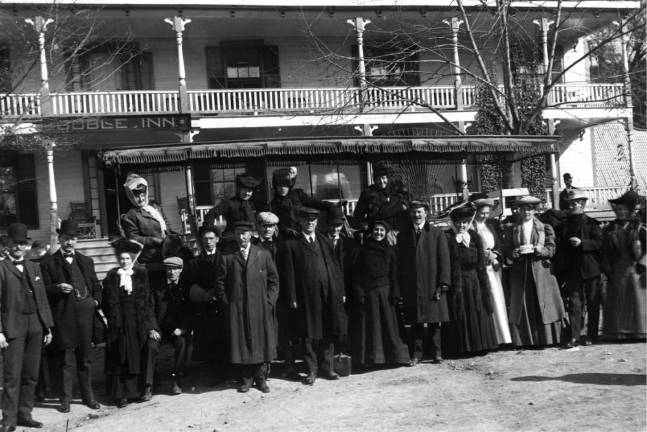
Sussex Borough has grown up from an old settlement and is a place with a distinct heritage.
The first known person here was Peter Decker about 1742, and there are many descendants of Peter Decker still in the area. The longevity of families who are found here is testament to the good sense of place that many retain for Sussex County.
This is one of my favorite towns. It was called Deckertown until 1902.
There are old buildings from the days of serving the many dairy farmers, the three fountains provided by town benefactors and a couple “blocks” of brick buildings on the main street known as Hamburg Avenue.
Similar to Branchville and Newton, there are many buildings in the town that easily can be traced back well over 100 years, and most look pretty much the same as when constructed. The Fountain Square Inn is one of these.
The “Fountain Inn” is said to be closed now, with a great change occurring. It is to be torn down and replaced with a new building housing 12 apartments with contained parking.
The Fountain Square Inn is one of the oldest, perhaps the most venerable, building in Sussex Borough, having been built about 1823 by the grandson of Peter Decker. Owners and operators since that time have included Chardavoyne’s, DeCamp House, Crisman House and Goble Inn.
It is located on Fountain Square, giving it the name. The fountains of Sussex brought gravity-fed water down the mountain from above Colesville and offered refreshment for the horses drawing milk wagons and produce to town. There was also a lower basin for the use by dogs.
Writings state that an old distillery was nearby. With the advent of the Professor Rankin’s arrival, it is said that gambling, horse racing, balls and riots decreased. There’s a tale of a citizen riding his horse into the tavern and mounting the bar. Oh, the wild days of yesteryear.
The quite rural nature of the area was changed with the development of America. New Jersey began the turnpike era in the early 1800s. This allowed for better roads on which people could travel.
Stagecoach service began shortly thereafter and allowed for travel from here to places like Paterson several times a week. This was amazing back in those days. The world ever changes, and by the 1870s, not one but two railroads traversed the lands of the town. The stagecoach service for the town had seen its days end in 1872.
Some travelers, of course, had their own transportation and rode their own horse or horse and carriage. There were stables behind the inn for such purposes. Somewhere in town there was probably a stable in the employ of the stage companies to provide rest for the weary and to give fresh horses for the long journey to the city.
The train service, with two stations, required overnight accommodations for the travelers. The inn would send a “station wagon,” a horse-drawn wagon dedicated to going to and from the train station. A photograph of one of these excursions is shown in front of the Goble Inn and hotel with well-dressed passengers eagerly holding tickets and having their bags packed.
Over the course of about 200 years, Sussex County residents have seen log cabins, stagecoaches, travel by train, cars and now many services done via the internet. The Fountain Square Inn provides a snapshot of the history in Sussex County over the centuries.
Bill Truran, Sussex County Historian